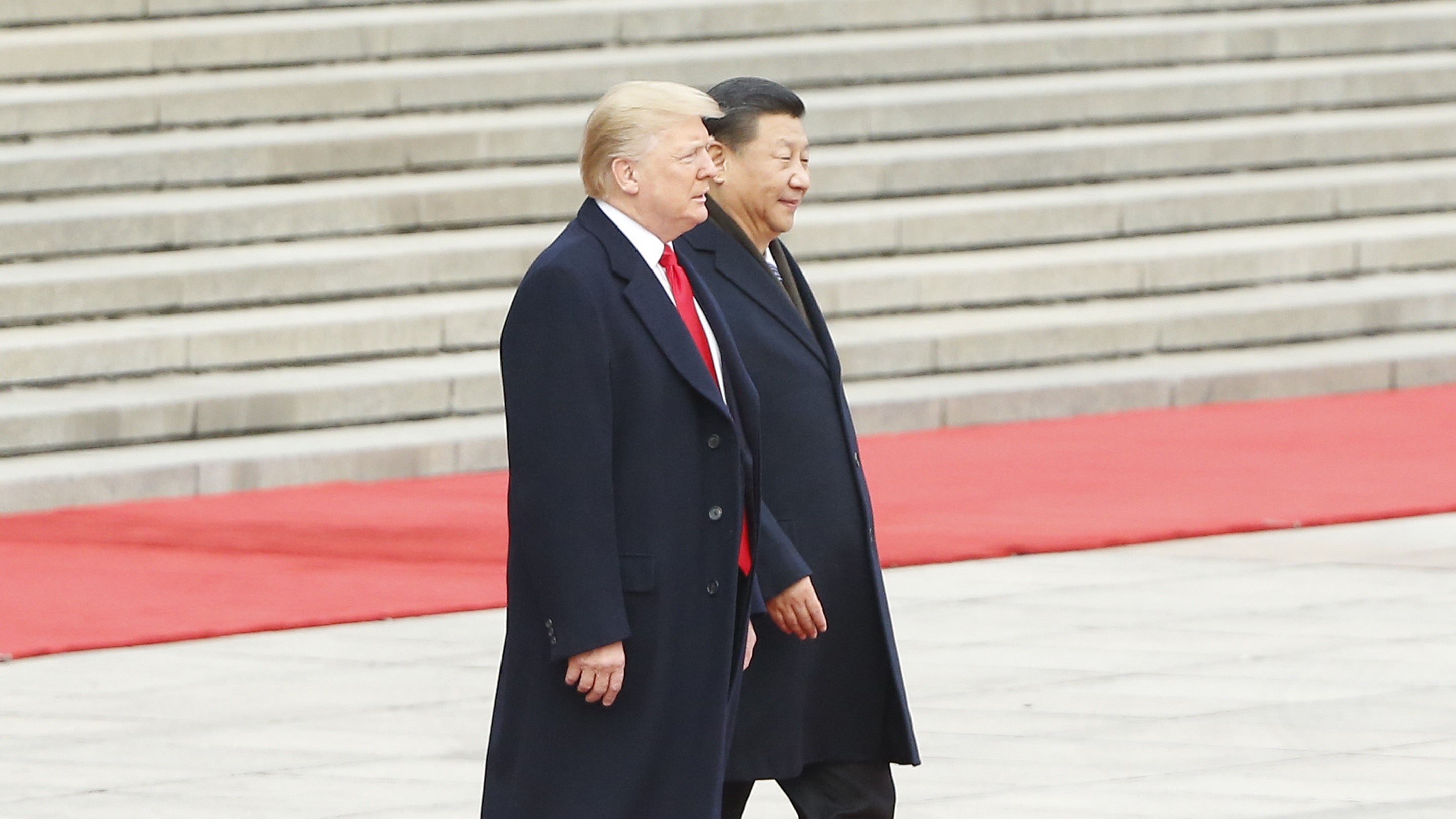The politics of naming Covid-19
Trump has labelled it the ‘Chinese virus’ but why does it matter what we call it?

A free daily email with the biggest news stories of the day – and the best features from TheWeek.com
You are now subscribed
Your newsletter sign-up was successful
Syphilis was once known as the “French disease” in Italy, the “Italian disease” in France, the “Spanish disease” by the Dutch, the “Polish disease” by Russians and the “Christian disease” by Turks.
These different names reflected contemporary political wranglings between nations, an issue raising its head again with the naming of the new coronavirus.
Covid-19 has impacted every corner of the globe, with confirmed cases on every continent. But how it is referred to depends on where you are – and your politics.
The Week
Escape your echo chamber. Get the facts behind the news, plus analysis from multiple perspectives.

Sign up for The Week's Free Newsletters
From our morning news briefing to a weekly Good News Newsletter, get the best of The Week delivered directly to your inbox.
From our morning news briefing to a weekly Good News Newsletter, get the best of The Week delivered directly to your inbox.
What is it actually called?
Technically speaking, the virus is called “severe acute respiratory syndrome coronavirus 2” (SARS-CoV-2), while the disease it causes is named “coronavirus disease (Covid-19)”.
As the World Health Organization (WHO) explains, viruses and the diseases they cause often have different names. For example, HIV is the virus that causes Aids.
Despite the virus’s name lending itself to the acronym Sars, WHO has avoided using this term from the beginning because “from a risk communications perspective, using the name Sars can have unintended consequences in terms of creating unnecessary fear for some populations”.
A free daily email with the biggest news stories of the day – and the best features from TheWeek.com
This is especially true across Asia, which bore the brunt of the 2003 Sars outbreak that killed 774 people in a dozen countries.
“For that reason and others,” WHO explains that it “has begun referring to the virus as ‘the virus responsible for Covid-19’ or ‘the Covid-19 virus’ when communicating with the public”.
So what’s in a name?
Outside scientific and medical circles, the name given to the virus and the disease becomes more complicated – and deliberately conflated – by politics.
President Donald Trump, for example, in the early days of the pandemic repeatedly referred to the coronavirus as the “Chinese virus” or the “Wuhan virus”.
After consulting with medical experts, and receiving guidance from the WHO, CNN determined that that name is both “inaccurate and is considered stigmatising”.
“Having a name matters to prevent the use of other names that can be inaccurate or stigmatising,” according to director-general of the WHO, Tedros Adhanom Ghebreyesus. “It also gives us a standard format to use for any future coronavirus outbreaks.”
The WHO guidelines, set in 2015, say that virus names should not refer to a geographical location, an animal, an individual or group of people, while still being pronounceable and related to the disease.
Trump has denied that the name is “stigmatising”, telling Fox News: “Look, everyone knows it came out of China.”
Asked if he thought that his references to the virus posed a risk to Asian-Americans, he added: “No, not at all. I think they probably would agree with it 100%. It comes from China.”
He also claimed that he began using the term after “Chinese media accused American soldiers of spreading the virus”, according to CNN.
Despite this, Al Jazeera reports that experts on the region claim that the name “will only increase tensions between the two countries and encourage xenophobia”.
Wendy Parmet, a law professor at Northeastern University and public health expert, told Time that naming the virus after its epicentre, Wuhan, would put a “tremendous stigmatisation on the people of Wuhan who are the victims” of the disease too.
Parmet added: “People tend to think of the disease as belonging to, as being a characteristic of some group of people associated with the place name, which can be really stigmatising.
“To be thought of as a hole of disease is not going to be productive. It encourages the next city not to come forward, not to report a disease if your city is labelled as the disease.”
–––––––––––––––––––––––––––––––For a round-up of the most important stories from around the world – and a concise, refreshing and balanced take on the week’s news agenda – try The Week magazine. Start your trial subscription today –––––––––––––––––––––––––––––––
Is this just a US-China issue?
According to Sky News, the British government has refused to confirm or deny reports that it made assurances to China about the way it refers to the coronavirus pandemic and its cause.
Diplomatic editor Dominic Waghorn reports that the Chinese Embassy in London claimed Foreign Secretary Dominic Raab promised Beijing it will not “politicise” the outbreak.
The embassy also said that Raab “fully agrees with China that the source of the virus is a scientific issue that requires professional and science-based assessment”.
As Waghorn notes, if that claim is true, the UK would be “seen as siding with China” in a growing international dispute over its handling of the fallout of the pandemic which began there.
The Foreign Office confirmed to Sky News that Raab had discussions with the Chinese ambassador and its foreign minister. It would not be drawn on the content of those talks.
-
 Why are election experts taking Trump’s midterm threats seriously?
Why are election experts taking Trump’s midterm threats seriously?IN THE SPOTLIGHT As the president muses about polling place deployments and a centralized electoral system aimed at one-party control, lawmakers are taking this administration at its word
-
 ‘Restaurateurs have become millionaires’
‘Restaurateurs have become millionaires’Instant Opinion Opinion, comment and editorials of the day
-
 Earth is rapidly approaching a ‘hothouse’ trajectory of warming
Earth is rapidly approaching a ‘hothouse’ trajectory of warmingThe explainer It may become impossible to fix
-
 A Nipah virus outbreak in India has brought back Covid-era surveillance
A Nipah virus outbreak in India has brought back Covid-era surveillanceUnder the radar The disease can spread through animals and humans
-
 The stalled fight against HIV
The stalled fight against HIVThe Explainer Scientific advances offer hopes of a cure but ‘devastating’ foreign aid cuts leave countries battling Aids without funds
-
 Obesity drugs: Will Trump’s plan lower costs?
Obesity drugs: Will Trump’s plan lower costs?Feature Even $149 a month, the advertised price for a starting dose of a still-in-development GLP-1 pill on TrumpRx, will be too big a burden for the many Americans ‘struggling to afford groceries’
-
 Covid-19 mRNA vaccines could help fight cancer
Covid-19 mRNA vaccines could help fight cancerUnder the radar They boost the immune system
-
 Can TrumpRx really lower drug prices?
Can TrumpRx really lower drug prices?Today’s Big Question Pfizer’s deal with Trump sent drugmaker stocks higher
-
 The new Stratus Covid strain – and why it’s on the rise
The new Stratus Covid strain – and why it’s on the riseThe Explainer ‘No evidence’ new variant is more dangerous or that vaccines won’t work against it, say UK health experts
-
 Why are autism rates increasing?
Why are autism rates increasing?The Explainer Medical experts condemn Trump administration’s claim that paracetamol during pregnancy is linked to rising rates of neurodevelopmental disorder in US and UK
-
 RFK Jr. vaccine panel advises restricting MMRV shot
RFK Jr. vaccine panel advises restricting MMRV shotSpeed Read The committee voted to restrict access to a childhood vaccine against chickenpox